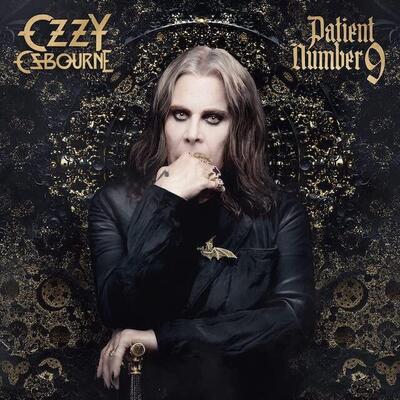"Nothing feels right": Ozzy sings those words in two songs. Also he realizes there's no escape. From death? Taxes? Worst of all, there's no escape from NOW. And he feels locked up. And his dead father haunts his dreams. And he has those days . . . those days when Jesus doesn't save.
Ozzy's disconnection connects -- and connects not just with those who know the unsettling side effects of tremor meds. Who doesn't wake up each day, look around and want to scream?
In the past, Ozzy has told us to scream. He has even told us to go crazy, while he knows well the difference between going and being. As for Ozzy the artist, he's now sliding into a much less cartoonish and more sympathetic version of the madman, while managing once again to create beauty and even inspiration with the help of his friends.
"Patient Number 9" is a collection of healing poultices containing one important common ingredient: Ozzy Osbourne's voice. Imagine the trust that comes with someone speaking to you for maybe more than half a century. And consider the distinctive quality of Ozzy's grandmotherly wheedle, mixed with a warrior's whooping lungs and a wonderful ability to deliver a nursery-rhyme melody. Pick up the phone, and we don't have to ask who's on the other end. We also know what that voice has been through, and we feel as if he knows our shit as well.
A large and varied team combines to make "Patient Number 9" an even stronger set than 2020's "Ordinary Man," which was damn good. 31-year-old producer-instrumentalist Andrew Watt again pumps the tent up with modern layering and dynamics, while inviting significant guitarists from rock's history (and Ozzy's) to offer perspective on just what a monumental musical figure we're dealing with. That kind of thing often falls flat, and here it doesn't.
The riskiest guests are Jeff Beck and Eric Clapton, both of whom in 1970, when Black Sabbath was widely considered a clumsy Brummy noise machine, probably would not have pissed on Ozzy if he were on fire. Beck is only one of three guitarists on the despair-laden multipart title track, an exciting piece of melodrama that benefits little from what sounds like a first-take Beck solo on the strummy coda. But when it comes to the cushy psychedelic stringed-up "A Thousand Shades (of Darkness)," Beck really makes the song with his zoomy bends and honest-to-gawd tonal variations, just ingenious.
Clapton probably sighed, "Lord, they want me to do 'White Room' again" when he heard the tracks for "One of Those Days," but to his credit, he turns the clock right back to 1968. Draping poetic obbligatos all over the place and cranking out a fierce wah solo over the heave-ho riff, Mr. Restraint sounds as if he's having the most fun since he's been off drugs.
Sabbath mate Tony Iommi presented a much safer choice, and his crushing riffs, delivered atop the battleship drums and bass of Chad Smith and Robert Trujillo, make for album highlights on "No Escape From Now" (nasty solo plus Sab accelerando & gallop) and "Degradation Rules" (Ozzy bleedin' lips on harmonica!).
Zakk Wylde's weighty ax, as it has for most of the last 34 years, remains the fulcrum of Ozzy's sound, present on nine tracks and featured in solos on four, bringing precision to the rhythms and virtuosity to the improvisations. Indispensable. Glance for instance at his method on the album's best track, "Nothing Feels Right." This beautifully constructed edifice moves from quiet arpeggio to hard-rock chorus, and when those power chords pile in, they have to ride the vocal like one flesh, dripping a tone that combines command with sensuality. Then Wylde's solo reflects a mind bouncing off the walls, straining to stay calm and periodically rocketing off into mania, stretching out a shaking hand toward something that might feel real, setting the stage for Ozzy to take the long drive home.
Besides the topnotch playing, there's much crafty composing here, with Watt and ubiquitous young songwriter Ali Tamposi contributing to most every song and many musicians generously credited.
So how old are you, Ozzy? Old enough to know. To offer his personal lesson in how history can repeat itself in different clothing, Ozzy concludes with "Darkside Blues," which, like many a folktale, could have been made up on the spot -- Watt on slide guitar, Osbourne blowing harmonica and huffling a silly story about a lost soul, a girl and a theft. As he's begun with a madman's cackle, he ends with a joker's laugh: "That's jazz!"
* * *
Read MetalJazz's 2020 review of Ozzy Osbourne's "Ordinary Man" here.

